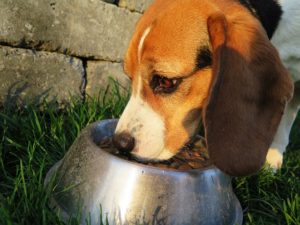
Many vegetarians have at some point been confronted with this question when it comes to giving their puppies meat when they do not consume it.
The answer is yes.
Puppies like humans can be omnivorous. This means they can convert certain foods into amino acids. Some of the proteins you can try include beans, milk, eggs, soy, corn, or whole grain.
Your puppy may take some time to adjust to a non-meat diet. You may find your puppy peeping through its diet with that look of “Where is the meat?”
The decision to change to a vegan diet is an important one for humans. You avoid slaughtering animals in an inhumane way; you also lower your risks of obesity, heart disease, and many other diseases that are associated with meat products. Puppies have various omnivorous characteristics that enable them to adapt to a vegan diet. These include:
- Their small intestines have the necessary gastrointestinal juices necessary for the conversion of amino acids in the proteins they consume.
- Their molars are flat like humans, and this helps them chew hard vegetables like carrots
- They also can also convert beta-carotene into Vitamin A
While the decision to provide a vegan diet for your puppy is a personal one, their cases where you find your puppy is allergic to proteins. According to Dr. Fox of US Humane Society, puppies can thrive on a purely vegan diet but is important that you supplement their diet with meat occasionally.
Continue Reading→
 Want to celebrate your dog’s birthday and make it very special? Here is a great video to show you step by step how to make a delicious cake and treats. Ingredients are listed below the video. This simple recipe can help you make a perfect dog birthday cake.
Want to celebrate your dog’s birthday and make it very special? Here is a great video to show you step by step how to make a delicious cake and treats. Ingredients are listed below the video. This simple recipe can help you make a perfect dog birthday cake.
 It seems that
It seems that 
 If you are looking for one of the cutest dog breeds ever then your search ends right here. Chusky or Husky Chow Mix is a breed that can steal your heart with its amazing personality and cuddly nature.
If you are looking for one of the cutest dog breeds ever then your search ends right here. Chusky or Husky Chow Mix is a breed that can steal your heart with its amazing personality and cuddly nature. Most of us love to keep dogs in our home to provide us with genuine friendship and company, among other emotional gains. In most case you will hear people telling stories about how their dogs love them, and how special they are in their own ways. There’s no question about dog’s love to their owners. But, does your dog respect you? How do you know this? When your dog shows some cheeky behavior like chewing the sofa, barking loudly, or bad table manners, it could mean that it doesn’t show you respect. Fortunately, you can easily learn
Most of us love to keep dogs in our home to provide us with genuine friendship and company, among other emotional gains. In most case you will hear people telling stories about how their dogs love them, and how special they are in their own ways. There’s no question about dog’s love to their owners. But, does your dog respect you? How do you know this? When your dog shows some cheeky behavior like chewing the sofa, barking loudly, or bad table manners, it could mean that it doesn’t show you respect. Fortunately, you can easily learn 
